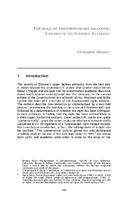| dc.description.abstract | The novelty of Ellmann's paper derives primarily from the fact that it moves beyond the separation of powers and counter-majoritarian based critiques and analyses that have dominated academic discourse about South African constitutional law. For instance, in the second edition of the Constitutional law of South Africa, Woolman and Botha outline the multi-part structure of the fundamental rights analysis. The authors describe interpretation as characterised by a two-fold process: determining the meaning or the scope of a fundamental right followed by a determination of whether the right has been infringed. In most instances, a finding that the right has been limited leads to a third stage: limitations analysis. Under section 36, courts are, quite 'controversially', given the power to decide whether a democratically conceived law's infringement of a fundamental right indeed violates the Constitution or whether, in fact, the infringement of a right can be justified. | en_US |

